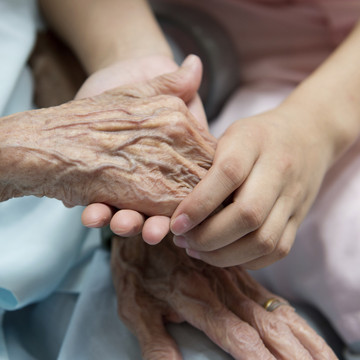Guidance from the federal Centers for Medicare and Medicaid Services now prohibits most visits to skilled nursing facilities except in “compassionate care” circumstances, including when patients are nearing the end of life. Facilities are taking all kinds of additional precautions against coronavirus transmission, including deeper cleaning protocols and caring for patients with symptoms separately.
Rodrigues agrees that locking down long-term care facilities makes sense, but says he’s concerned about increased social isolation for patients there.
“I encourage families and friends of residents to make contact with residents, call, use FaceTime, use Skype,” he said. “Let these people know that they’re loved and that they’re cared for.”
With group activities and communal dining deemed too risky, long-term care facilities are working to minimize social isolation in a number of ways, says Deborah Pacyna, who directs public affairs for the California Association of Healthcare Facilities.
“Really people are turning to technology,” Pacyna says, adding that some facilities have organized efforts to get schoolkids to make greeting cards for people in nursing homes.
She recommends that members of the public who wish to support long-term care patients in greater isolation should call facilities directly, donate or loan iPads or old iPhones to enable FaceTime, or send greeting cards and flowers to the main desk.
Other Consequences for Patients?
An aggressive response against coronavirus protects patients against a fast-moving risk, but other safety concerns for residents remain.
The California Department of Public Health, which regulates skilled nursing facilities, and the Department of Social Services, which oversees assisted living facilities, have put in-person inspections on hold. A spokesman for CDPH says that investigations of complaints and facility-reported incidents continue, “but surveyors have been advised to do so through virtual, audio, or electronic methods.”
California’s regulators are taking a slightly more cautious route than federal rules require. Federal rules still include an exception permitting surveyors to enter nursing homes as long as their risk of transmitting coronavirus is low.
Patients’ rights advocates say regulatory inspections are a necessary tool for protecting patients in long-term care facilities, so ending those surveys is a loss. Nearly 82% of California nursing homes have failed infection control standards in the last two years, according to a Kaiser Health News analysis. (The California Association of Healthcare Facilities argues that statistic is misleading, since most of the deficiency notices given to nursing homes are not “immediate jeopardy” cases.)
“They need to think that we can walk in the door anytime,” says Nicole Howell, the executive director of ombudsman services for Alameda, Contra Costa and Solano counties.
Long-term care ombudsmen perform a wide range of services for patients in California, from investigating abuse complaints to handling medical and legal problems to visiting patients without close family members.
“We are by their bedside or standing with them in their room,” says Benson Nadell, the long-term care ombudsman for San Francisco. Nadell says some patients are nonverbal but still communicative, and they need visual cues; others have memory loss and disorientation, and respond more positively to in-person visits. “We have to somehow reassure them over the phone, and hope that this restriction on visiting is not into May and June,” Nadell says. “That would be really awful.”
Julie Pollock, a program manager with California Advocates for Nursing Home Reform, says the coronavirus response is highlighting existing hazards for patients.
Pollock says her group has heard from family members who regularly visit facilities to fill the gaps in care for loved ones. One woman says she and her family were round-the-clock visitors after finding her mother choking on secretions around a tracheostomy tube. She says she is worried now that she cannot be there to watch over her.
“With these new orders, who is looking out for the residents?” Pollock says. “Why is there not a better plan to keep them safe?”
Help KQED Science report on the pandemic!

